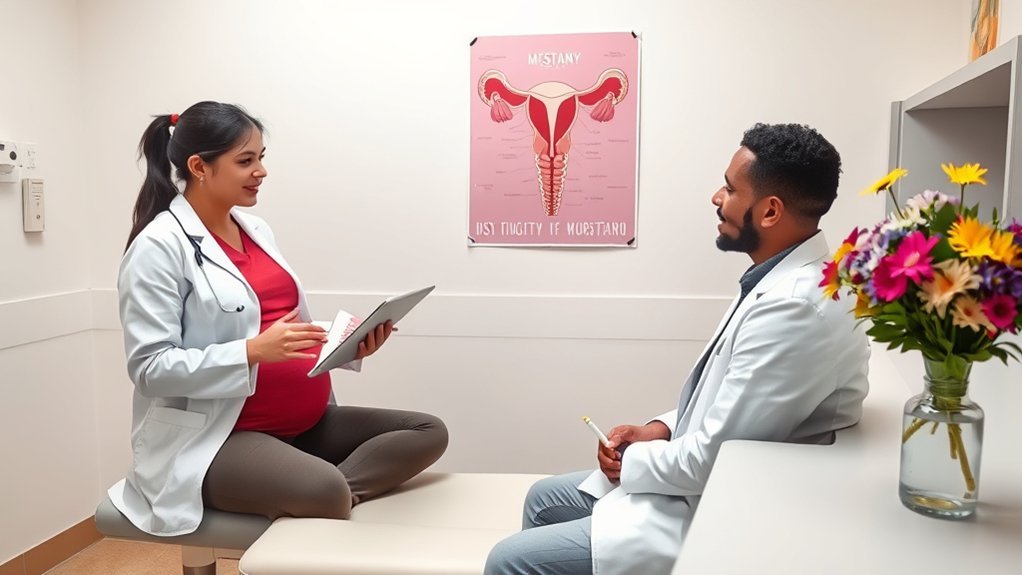Your first prenatal visit is a significant milestone, and being prepared can make the experience smoother. You’ll want to know what to bring, the right questions to ask, and the essential health information to share. It’s equally important to be aware of what to avoid before your appointment. Understanding these do’s and don’ts can help you navigate this exciting journey with confidence. Let’s explore what you need to know.
What to Bring to Your First Prenatal Visit

When preparing for your first prenatal visit, it’s essential to gather a few key items to guarantee a productive appointment.
Start by bringing your medical history, including any previous pregnancies, surgeries, or chronic conditions. It’s also helpful to have a list of any medications or supplements you’re currently taking.
Bring your medical history, including past pregnancies and surgeries, along with a list of current medications and supplements.
Don’t forget to bring your insurance information, as this can streamline the check-in process. If you’ve taken a pregnancy test, consider bringing those results, too.
A notepad or device for taking notes can be invaluable for jotting down important information during your visit.
Finally, wearing comfortable clothing can help you feel at ease during any examinations. Being prepared will make your appointment smoother and more beneficial for you and your baby.
Questions to Ask Your Healthcare Provider

What should you ask during your first prenatal visit? It’s essential to prepare a list of questions that address your concerns and needs. Here are some important topics to discuss:
| Question Category | Example Questions | Purpose |
|---|---|---|
| Prenatal Care | What should I expect during my pregnancy? | Understanding care frequency |
| Nutrition | Are there any dietary restrictions I need? | Ensuring a healthy diet |
| Labor and Delivery | What are my options for pain management? | Preparing for labor |
| Screening Tests | What tests will I need and when? | Staying informed about health risks |
| Postpartum Care | What should I know about recovery? | Planning for postpartum health |
Feel free to add any personal concerns you may have, ensuring open communication with your provider.
Important Health Information to Share

Sharing important health information during your first prenatal visit is essential, as it helps your healthcare provider tailor care to your unique needs.
Be open about your medical history, including any chronic conditions like diabetes or hypertension. Discuss past pregnancies and any complications you experienced.
Don’t forget to mention medications, supplements, and allergies, as they can greatly impact your care. If you have a family history of genetic disorders, share that too; it’s critical for evaluating potential risks.
Lifestyle factors, such as smoking or alcohol use, should also be addressed honestly.
Common Tests and Procedures During Your Visit
After you’ve provided your healthcare provider with important health information, they’ll likely recommend several common tests and procedures during your first prenatal visit.
Expect a blood test to check for your blood type, Rh factor, and any potential infections. They may also conduct a urine test to assess for protein, glucose, and other crucial indicators of your health.
A pelvic exam might be performed to evaluate your reproductive health, and an ultrasound could be scheduled to confirm your pregnancy and check for the baby’s heartbeat.
Additionally, your provider may discuss prenatal vitamins and lifestyle adjustments to support a healthy pregnancy.
Things to Avoid Before Your Appointment
To guarantee your first prenatal visit goes smoothly, there are several things you should avoid beforehand.
Being mindful of these can help assure you make the most of your appointment.
- Skipping meals: Arrive on an empty stomach, especially if tests might require fasting.
- Ignoring medication instructions: Don’t forget to ask your doctor about any medications you should avoid before your visit.
- Overthinking your symptoms: Avoid stressing over every little ache; focus on key concerns you want to discuss.
- Bringing too many people: Limit your support team to one or two trusted individuals to keep the environment calm and focused.
Frequently Asked Questions
How Can I Prepare Emotionally for My First Prenatal Visit?
To prepare emotionally for your first prenatal visit, acknowledge your feelings, practice relaxation techniques, and communicate openly with your partner. Remember, it’s a significant step, and being prepared helps alleviate anxiety and fosters connection.
What Should My Partner Expect During the Appointment?
Your partner should expect a warm environment, discussions about your health, and potential tests. They’ll witness your excitement and concerns, and may even participate in questions, making the experience more supportive and enriching for both of you.
Can I Bring Children to My Prenatal Visit?
You can bring children to your prenatal visit, but it’s helpful to take into account their behavior and attention span. If possible, arrange for childcare to guarantee you can focus on your appointment without distractions.
How Long Will the First Prenatal Visit Typically Last?
Your first prenatal visit typically lasts about one to two hours. You’ll discuss your medical history, undergo essential tests, and ask questions. It’s a vital time for you to connect with your healthcare provider.
What if I Feel Nervous About the Visit?
It’s completely normal to feel nervous before your visit. Take deep breaths, remind yourself that your healthcare provider is there to help, and consider jotting down questions beforehand. You’re not alone in this experience.
Conclusion
Your first prenatal visit is a crucial step in your pregnancy journey. By coming prepared with necessary documents and questions, you set the stage for a supportive experience. Remember, it’s normal to feel anxious, but focusing on what you can control—like your health and questions—can make a big difference. Picture your visit as a partnership with your healthcare provider, where open communication paves the way for a healthy pregnancy and peace of mind.
